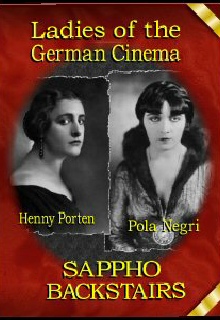







Ladies of the German Cinema
Stars: Pola Negri / Henny Porten
Director: Dimitri Buchowetzki / Leopold Jessner & Paul Leni
Runtime: 82 Minutes / 50 Minutes
Language: English subtitles -
Color: Tinted / Black and White
Format: DVD (replicated release)
Rating: NR
Price: $19.95
Sappho
(1921)
Directed by Dimitri Buchowetzki
Cast:
Pola Negri ... Sappho
Johannes Riemann ... Richard de la Croix
Alfred Abel ... Georg de la Croix
Albert Steinrück ... Andreas
Helga Molander ... Maria Garden, Roichards Braut
Otto Treptow ... Teddy
Elsa Wagner ... Richards Mutter
Ellinor Gynt ... Tänzerin
and
Backstairs (a.k.a. Hintertreppe)
(1921)
Directed by Leopold Jessner and Paul Leni
Cast:
Henny Porten ... Das Dienstmädchen
William Dieterle ... Der Postbote (as Wilhelm Dieterle)
Fritz Kortner ... Der Handwerker
Eugene Dieterle
Music scores by Jack Hardy
Berlin, Germany, 1921. The new Weimar Republic was in the midst of a powerful creative renaissance that still affects the arts as we know them today. Then and now, the most celebrated medium of Weimar Germany’s artistic revolution was its movies, and some of Germany’s most loved and celebrated actresses were at the height of their popularity. Some of those names include Asta Nielsen, Lil Dagover, and the two ladies featured in these two German films from 1921: Pola Negri and Henny Porten.
Pola Negri’s Sappho is a rare, largely unseen film that has been restored with its original tints and released on video for the first time ever, complete with a devastating orchestral score. The story is an ornate, contemporary costume drama about a notorious vamp whose long run of using men is brought to an abrupt halt when she meets the love of her life. However, the ghosts of her past haunt the new relationship, including the fact that she has previously driven her new beau’s brother insane. (The lunatic brother is played by Alfred Abel, best known today for his role as Fredersen, the aristocratic lord of Metropolis [1927]). Sappho showcases Negri in many roles—a mother, a bride, a heartless socialite, a devoted lover—and each role she plays is completely and thoroughly believable. Her staredown of a former lover when he brandishes a gun jumps off of the screen; her silent scream at the film’s end is so potent that it seems audible. The film itself was censored when it first reached American shores, and was only released in an altered version called Mad Love; this is the original, uncensored European version. 82 Minutes
Meanwhile, Henny Porten’s Backstairs (aka Hintertreppe) is one of the earliest attempts at reproducing a pioneering and revolutionary genre of German theatre called "intimate theatre" (kammerspiel). This purposefully minimalistic film seized the imaginations of film critics, and helped pioneer a small but very influential subgenre of German film called the kammerspielfilm; this film style would come to a greater fruition in F. W. Murnau’s Sunrise (1927) and Hedy Lamarr’s breakthrough film Ecstasy (1933), for example. Henny Porten’s career correlates to that of America’s Mary Pickford in many ways, except that Porten came off as a sexy mother figure, whereas Pickford was a sexy daughter figure. It should be of no surprise that Porten played many matronly characters in German movies, including an appearance as Mary, mother of Jesus, in the recently rediscovered 1924 German epic I.N.R.I. Most of Porten’s films are difficult to find and few were released in America, so this is a rare opportunity to watch her in top form. 50 Minutes
—David Gasten -
Comments:
Grapevine Video’s Ladies of the German Cinema DVD breathes new life into two of Germany’s greatest movie queens! You’ll see the unveiling of the hard-
-
Webmaster, The Pola Negri Appreciation Site